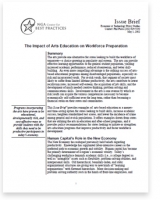The Impact of Arts Education on Workforce Preparation
GENERAL
The arts provide one alternative for states looking to build the workforce of tomorrow - a choice growing in popularity and esteem. The arts can provide effective learning opportunities to the general student population, yielding increased academic performance, reduced absenteeism, and better skill-building. An even more compelling advantage is the striking success of arts-based educational programs among disadvantaged populations, especially at-risk and incarcerated youth. For at-risk youth, that segment of society most likely to suffer from limited lifetime productivity, the arts contribute to lower recidivism rates; increased self-esteem; the acquisition of job skills; and the development of much needed creative thinking, problem solving and communications skills. Involvement in the arts is one avenue by which at-risk youth can acquire the various competencies necessary to become economically self-sufficient over the long term, rather than becoming a financial strain on their states and communities.
This Issue Brief provides examples of arts-based education as a money-and time-saving option for states looking to build skills, increase academic success, heighten standardized test scores, and lower the incidence of crime among general and at-risk populations. It offers examples drawn from states that are utilizing the arts in education and after-school programs, and it provides policy recommendations for states looking to initiate or strengthen arts education programs that improve productivity and foster workforce development.
This Issue Brief provides examples of arts-based education as a money-and time-saving option for states looking to build skills, increase academic success, heighten standardized test scores, and lower the incidence of crime among general and at-risk populations.
BIBLIOGRAPHY






